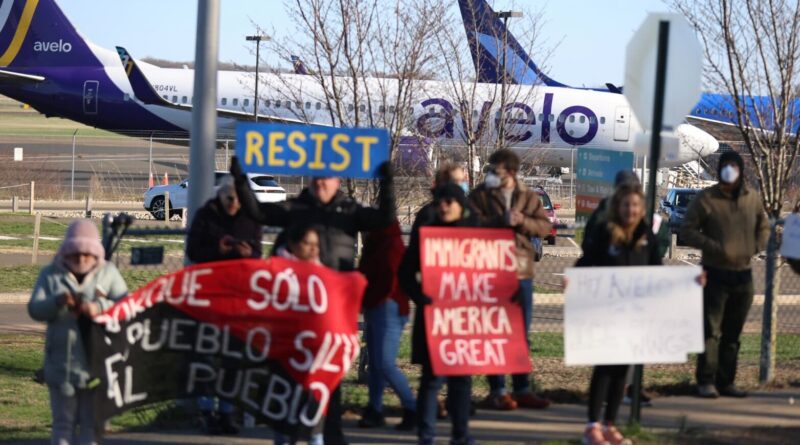Nationwide Protests Erupt over Avelo’s ICE Deportation Agreement
Community groups such as the Immigrant Allies Forum, the Wilmington Chapter of the Democratic Socialists of America, and Indivisible Wilmington were seen rallying along the roadway leading to Wrightsville Beach, appealing to holidaymakers to consider their moral standings. The plan behind selecting this location for protesting, according to one of the coordinators, was the maximization of reach to shed light on Avelo’s recent agreement with the U.S. Immigration and Customs Enforcement (ICE) to facilitate deportation flights.
Avelo, a budget airline company which operates across 23 states, had recently opened a new base of operations in Wilmington. Since this establishment, several demonstrations have broken out within the city. The first of these protests against Avelo took place in May, right in front of the airport. However, this week marked the beginning of a nationally coordinated movement which sought to apply economic stress on the airline in response to their controversial agreement.
The situation has now escalated into a nationwide outcry, with protests taking place in multiple cities where Avelo operates. A protester expounded on the crux of the matter, pointing out, ‘Avelo Airlines is a commercial airline, and it’s the sole commercial enterprise that holds a contract with ICE. They are facilitating deportation flights from Arizona to El Salvador. Our intention is to encourage people to boycott them.’
Public thoughts on immigration are divided and persuading travelers to rethink their loyalties might prove demanding. Nevertheless, both local and national supporters of the cause aim to influence travelers to reconsider their airline preference as a symbolic gesture. Apparently, their efforts are bearing fruit. According to a protester, ‘Avelo has had to cancel some flights and diminish their service in some areas – not here in Wilmington – but in other parts of the country.’
Their hope is that these smaller-scale endeavors will eventually bring about larger shifts in the locality. Avelo has defended its actions, justifying the partnership with ICE as a financially driven decision. One of the members of the steering committee for the protesting advocacy groups decided to further investigate the matter by filing a public records request with the New Hanover County Airport Authority.
After a few months of waiting, the Deputy Airport Director returned his request. He clarified that the Airport Authority did not provide any financial backing to Avelo, nor did they approve any adjustments to the Avelo budget. He forwarded a copy of the standard lease agreement Avelo had, identical to all other airlines operating from ILM, and attached the authority’s incentive program which is equally offered to all airlines.
Despite these initial denials, after numerous email correspondences, he had to admit that local marketing funds had been used to promote Avelo flights and ILM Airport since Avelo initiated their undertakings. Avelo’s operations have also played a significant role in stimulating the local economy since their inception.
However, a protester brought up a rational argument that there’s uncertainty about the airline’s impact on the local economy compared to the overall $1.1 billion tourist expenditure within New Hanover County in 2023. Considering the county’s GDP was less than $20 billion during the last fiscal year, it’s dubious to credit Avelo for a significant portion of the economic activity.
He further emphasized that these economic considerations divert the attention from the actual ethical issue at hand. Are we prepared to disregard Avelo’s questionable involvement in deportation flights that could be possibly seen as illegal and inhumane, just because there are economic benefits to their operations? How much importance do we accord to our ethics if we choose to let such deportation flights persist uninterrupted?
Much contention exists around the issue, and sharp questions about the moral compromise are raised. This matter involves balancing financial benefits against the potential harm to humans, which becomes a major ethical challenge. The discussions are crucial in deciding the future course of airlines engaged in practices like deportation flights in collaboration with ICE agencies.
No definitive conclusion has been reached, but these protests and the debates they’ve sparked provide a platform for discussion. The dialogue not only brings attention to the monetized relationship between airlines and ICE but also draws emphasis on the choices we make as consumers and their potential societal impact.
Even amidst controversy and debate, the ultimate decision rests with the visitors and travelers. Their choices can fuel or dissuade potentially unethical practices, summoning us to reevaluate our ethical stands and question which issues truly matter to us.
This whole episode questions the moral compass of society at large, pitching economic advantages against human rights. Protesters hope that raising awareness through these peaceful demonstrations and dialogues can enable conscious consumption and foster more informed decision-making among the public.
This instance also shines a light on the powers of peaceful protests and consumer decisions in prompting firms and corporations to introspect and potentially reevaluate their practices. As more people get involved in these debates, it may spur companies to rethink their actions to maintain their public image and loyalty amidst an increasingly conscious consumer base.
The arguments and protests against Avelo’s partnership with ICE are indeed compelling, forcing us to weigh the benefits of economic progress against the price of human rights. As these discussions continue to unfold, we are reminded again about the power each one of us holds and the substantial impact our seemingly small decisions can make.
The debate surrounding Avelo’s relationship with ICE incites broader questions about the role of commercial entities in governmental affairs, particularly on divisive issues such as immigration. It emphasizes the profound implications of commercial choices and the power we hold as consumers to shape these discussions and potentially impact these practices.



